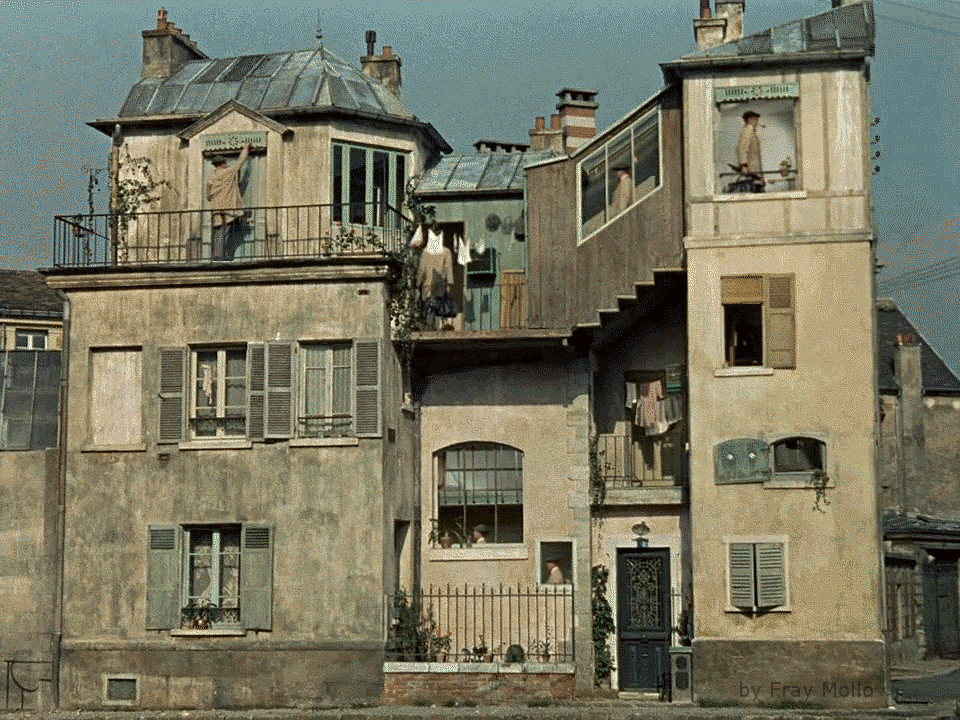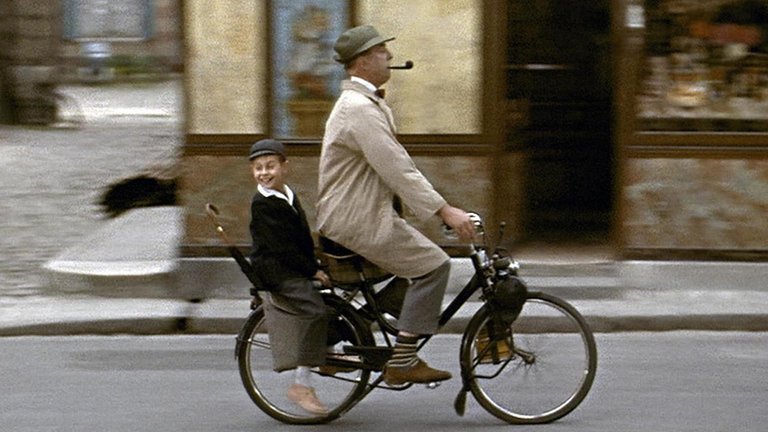Mon Oncle (1958)
Dir — Jacques TatiMon Oncle (My uncle) is said to be the most recognized Tati film in the west, surprisingly more so than his magnum opus, Playtime. In Mon Oncle Tati has fingers pointed at social dogmas such as conformity and the desire to be more appealing, more social, presentable and acceptable through possessions and wealth and public display of those. It also features Tati's fear of modern gadgets and the consumerism they encourage, (although that fear got blown up in full in Playtime). However, the film has a much more simplistic approach to comedy than Playtime.
In a futuristic France, a factory owner has a super modern house where everything is done by machines. Automated home. There's an electric fountain in the yard. However, the lady of the house doesn't really want the utility bill to rack up. But their public face must prevail! Every time a visitor comes, she switches on the fountain, and when they leave, she quickly turns it off. Sometimes, when the visitor is a working man of a lower class ( a poke at the social class difference and bourgeoise mentality here) or a member of the family, she gets annoyed and turns it off immediately. Her brother is Monsieur Hulot, Tati's recurring character in multiple films, and he's pulling all kinds of shenanigans in this film ass well. And this time he's the uncle to the lady's youngster, whom she tries to discipline with iron hands while he spoils him.
I rewatched the film with a couple of friends a few nights ago, and enjoyed it like I did the first time. Perhaps more. Tati's mesmerizing performance as Monsieur Hulot and memories of those scenes created a sort of longing and anticipation. This craving for something you loved and enjoyed is not all that uncommon for me. I have it for favorite places, books, music too. I suppose many will relate to this.

Source
Take this scene for an example, someone made an exaggerated GIF out of it but it will convey the point. In this shot, Monsieur Hulot is coming back to his abode, a shabby renting house in a ghetto like place. He goes through a series of doors, balconies and the camera is on the road, taking the whole scene with an establishing shot. Traversing the maze that is the apartment, Hulot arrives at his room at the top of the building. There is subtle visual comedy here, the finest stuff in my opinion. The building and the neighbourhood is noisy, full of life with the colorful inhabitants — very much unlike the home of his sister and the company she keeps. Perhaps Tati saw engagement, sincerity and laughter as opposing force to the machinist, consumer lifestyle.
I vividly recall how effortlessly Tati makes Hulot's absurd existence in a hostile world so enjoyable through his gait. In the kitchen shot, for instance, he's in there, but there's all sorts of buttons for automatic food management. Hulot extends his hand to touch one, and immediately backs away and it doesn't feel like he's acting at all.
Although the film revolves around the eccentricities of the boy's uncle, the character of the boy is well developed as is the world he and his uncle share. There's a recurring comedy trope throughout the film. The boy keeps company with some of the other kids of the neighborhood. Together they hide behind a barrier of sort, whistle at the passerby when they are near any electric pole. Then they bet on whether the passerby will run into it. The act is mischievous sure, perhaps wrong too — but also an ode to life, quite unlike the jail routine his mother loves to have him subjugated to.
The film is dominantly a comedy but it masquerades much more serious themes underneath. It would be too simplistic an approach to say Tati disliked modernist gadgets and excessive consumerism, (which is a reality today by the way), his mode of expression through visual comedy gig is art all by itself. That is what matters to me the most.

You can read more of my film and literature related articles on my hive blog page.



Yet another older film that I had no idea existed before now! Your description, along with the accompanying image and gif, give it a Mary Poppinsian or Wonkaesque feeling that I !LUV... my cinematic bucket list is getting pretty damn long! lol
Ha ha, well, it can be described as so I suppose, in some ways. But I think Buster Keaton-ish vibe is closer.
More accurately, Keaton and Fellini mashed together.
Hi @notacinephile, you were just shared some LUV thanks to @thatcryptodave. Holding 10 LUV in your wallet enables you to give up to 3 LUV per day, for free. See the LUV in your wallet at https://hive-engine.com or learn about LUV at https://peakd.com/@luvshares https://ipfs.io/ipfs/QmUptF5k64xBvsQ9B6MjZo1dc2JwvXTWjWJAnyMCtWZxqM
@notacinephile! This post has been manually curated by the $PIZZA Token team!
Learn more about $PIZZA Token at hive.pizza. Enjoy a slice of $PIZZA on us!
It was really fun watching it the other day... and Hulot's performance seemed so natural... after that Bean seemed exaggerating... It was a bit comical that his brother-in-law was jealous of him because of Hulot's relationship with his son
It's amusing that the brother in law does pick up some mischievousness at the end of the film though. ;)
Oh boy have I missed you.. another time to be bedazzled by the works of a master
It is surely that. :) Give it a watch, you'll probably like it as well.
Drama has never really been my thing.. but recently I've been thinking about other genres of movies a lot.. maybe it's time I tried other genres
Drama has many colors and shapes of course. A crime drama, for an example, is way closer to a action film than, lets say, a family drama. A legal drama / court room drama will likely have way faster pace than a philosophical drama and so on. In some way, every film can be fitted into some sort of drama I think.
It seems you talk more about classical movies and their directors more about often than you talk about new age movies.. in your opinion which new age directors would you consider cinematography geniuses
Yes, I do connect with older films and their makers way more easily for a number of reasons.
Among the new directors, I like Damien Chazelle, Robert Eggers quite a bit.